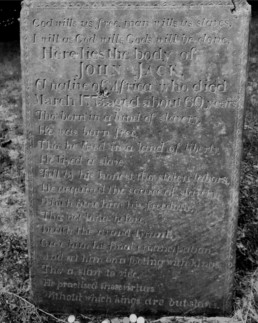The town of Concord, MA is rich in history and charm. When I go there, I am always drawn to the cemeteries which dot the hillsides in and around the town. I recently spent a few days in the town and walked through Old Hill Burying Ground and Sleepy Hollow Cemetery where one can find the resting places of Minutemen and other prominent townspeople including the writers Ralph Waldo Emerson, Nathaniel Hawthorne, Henry David Thoreau and Louisa May Alcott. But there are also men like John Jack, a freed slave who died at age 60 in 1773 (see the complete photo of his headstone below). The inscription on his headstone is remarkable. It reads:
“God wills us free. Man wills us slaves.
I will as God wills Gods [sic] will be done.
Here lies the body of
John Jack,
A native of Africa who died
March 1773, aged about 60 years
Tho’ born in a land of slavery,
He was born free.
Tho’ he lived in a land of liberty,
He lived a slave,
Till by his honest, tho’ stolen labors,
He acquired the source of slavery,
Which gave him his freedom,
Tho’ not long before,
Death the grand tyrant
Gave him his final emancipation,
And set him on a footing with kings.
Tho’ a slave to vice,
He practiced those virtues
Without which kings are but slaves.”
It is amazing to me, in 2017, to read these words, carved into a slate slab two years before the start of the American Revolution came to Lexington and Concord in April 1775. It certainly informs us of the racial division that has been a part of the American story from long before the Revolution, but it also suggests that there is a tradition in our nation that has resisted the dehumanizing oppression of racism. American society once again revisits the traumas of racial division that have stained our national history as we debate the merits of Confederate memorials (the majority of which were erected at the time of the First World War by the Daughters of the Confederacy) and it is alarming to see how many of our wounds from the eras of Civil War and Reconstruction are again being opened.
It is devastating to consider that there are still casualties in the war for America’s racial conscience. I am thinking about Heather Heyer, and the 19 injured last weekend in Charlottesville, as well as the 178 black Americans who have died so far in 2017 at the hands of predominantly white law enforcement agencies.
I was in New Orleans this spring, when neck-bearded white protesters wearing Lynyrd Skynyrd t-shirts and waving Confederate flags tried to defend statues of Confederate President Jefferson Davis, Robert E. Lee and General Beauregard. I found the display of Southern pride was completely overshadowed by an ugly veneer of hillbilly dirt and white supremacist neck tattoos. At the time, I considered that it was not ideal to remove these statues completely, because I am not in favor of sanitizing history to conform entirely to present-day moral standards. History is about knowing the past, even the ugly parts. But how much do these monuments represent that history? How well does a bronze of Jefferson Davis represent the carnage and loss of the worst war in American history? How well does it represent the degradation and cruelty of slavery and the injustice of institutionalized racism that has persisted for over 150 years since the death of Mr. Lincoln? It is clear to me that American history as filtered by the alt-right — including President Trump and his stupid, reactionary “Make America Great Again” message — is not being well served by the efforts to defend these symbols of southern, pro-slavery, secessionist leaders. So now I say, take them down, and put them in a museum where the message is properly framed to allow these symbols their place in a thoughtful historically educational context. Take them down and take away the allure they offer to present day malcontents who claim some insight into a national history they have obviously not read at any reasonable depth. Take the sculptures down, I say, and replace them with libraries where books about the history of this country can be found and read and contemplated.
What was once known as Lee Park in the town of Charlottesville, VA is now known as Emancipation Park, and the park itself will soon be emancipated from the shadow of General Robert E. Lee. If you’ve read a little American history, you may reasonably conclude that this is a fitting evolution: a monument to the march of history that defeated Southern secession, and the institution of slavery that so damaged this country and our society. The damage of slavery is still with us, and I believe it always will be with us. We must acknowledge it, live with it, respect it as a terrible part of our nation’s history. And we must fight any attempt to describe it as anything other than an abhorrent and cruel institution that almost ended our great nation and its experiment in liberty. We must honor the many heroes who have risen to prominence since and respect the commitments and sacrifices they made. Remember Rosa Parks, Medgar Evers, Malcolm X, Martin Luther King, Jr. and many more, and in so doing, I hope you will conclude that there can be no going back. Glorifying and romanticizing America’s racist past will never Make America Great Again.

